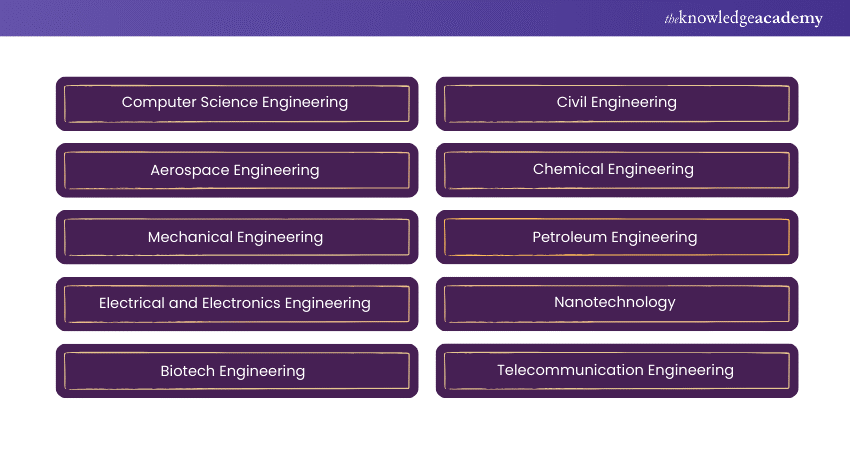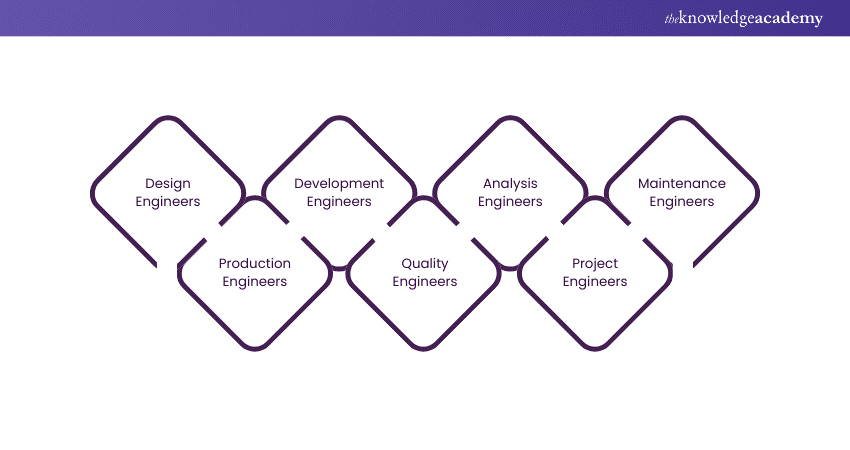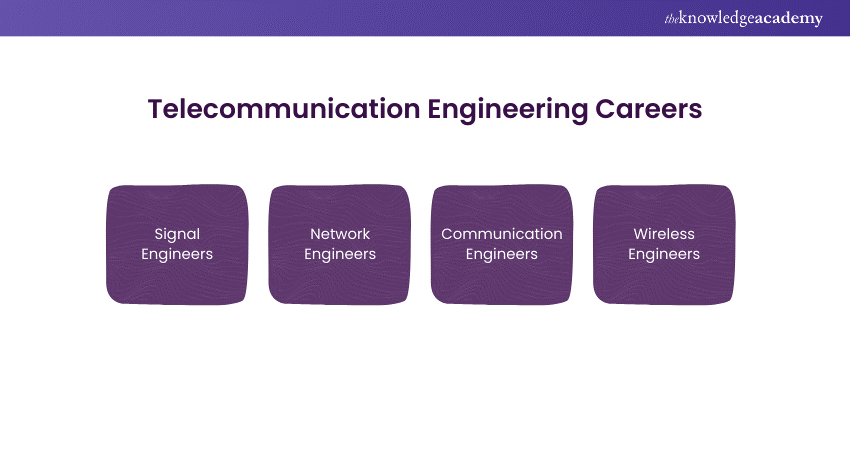We may not have the course you’re looking for. If you enquire or give us a call on +971 8000311193 and speak to our training experts, we may still be able to help with your training requirements.
Training Outcomes Within Your Budget!
We ensure quality, budget-alignment, and timely delivery by our expert instructors.

Engineering stands as a globally esteemed and fulfilling area of study. Engineers play a pivotal role in crafting, enhancing, and innovating diverse systems, products, and processes that enhance our daily lives with ease, safety, and efficiency. This dynamic field continually evolves, aligning with society's changing needs and challenges, showcasing its adaptability and resilience.
If you are interested in pursuing a career in Engineering, you may wonder which Engineering courses will be the best and most in demand in the future. To help you decide, we have compiled a list of the top 10 Best Engineering Courses that will be in great demand in the coming years. These courses are based on the current and projected trends, demands, and opportunities in the Engineering sector.
Table of Contents
1) Why is there such a need for Engineers?
2) 10 most in-demand Engineering Courses
a) Computer Science Engineering
b) Aerospace Engineering
c) Mechanical Engineering
d) Electrical and Electronics Engineering
e) Biotech Engineering
f) Civil Engineering
g) Chemical Engineering
h) Petroleum Engineering
i) Nanotechnology
j) Telecommunication Engineering
3) Conclusion
Why is there such a need for Engineers?
Discussed below are some of the reasons why an Engineer is needed across various fields:
a) Engineers address real-world problems by applying scientific and mathematical principles to design, develop, and improve various systems, products, and technologies.
b) Engineers are valued highly for their creativity, innovation, and vision, essential for creating a thriving knowledge-based economy.
c) Engineers significantly impact the world by shaping the physical environment, enhancing the quality of life, and solving challenges in the fields of health, energy, environment, and more.
d) Engineers have a range of niches, career options, and job outlooks, as Engineering is a diverse and dynamic field covering various applications and industries.
e) Engineers have a high salary potential, as Engineering is one of the highest-paid professions globally, with the possibility to earn more depending on experience, skills, and qualifications.
10 most in-demand Engineering Courses
Here we will discuss about the top 10 high demand Best Engineering Courses.

Computer Science Engineering
Computer Science Engineering involves exploring the principles, planning, and execution of computer systems and software. Computer Science Engineers are involved in various aspects of computing, such as programming, algorithms, data structures, artificial intelligence, web development and cloud computing. Computer Science Engineering is often considered one of the Best Engineering Courses, as it offers various career options and opportunities in various industries and sectors.
Computer science engineers can work as:
a) Software Developers
b) Software Engineers
c) Software Testers
d) Software Architects
e) Data Scientists
f) Data Analysts
g) Data Engineers
h) Machine Learning Engineers
i) Artificial Intelligence Engineers
j) Cybersecurity Engineers
k) Web Developers
l) Web Designers
The demand for computer science engineers is driven by the increasing use and reliance on digital technologies, data, and software in various domains, such as business, education, health, entertainment, and government. Computer Science Engineers in the UK earn an average annual salary of £40,000, and experienced professionals with enhanced skills and qualifications have the potential to command salaries of £100,000 or more, reflecting the industry's recognition of expertise and experience.
Aerospace Engineering
Aerospace Engineering involves the examination of the planning, creation, experimentation, and functioning of aircraft, spacecraft, satellites, rockets, missiles, and various airborne vehicles and systems. Aerospace engineers are involved in various aspects of Aerospace Engineering, such as aerodynamics, propulsion, structures, materials, control, navigation, communication, and more.
Aerospace Engineering is one of the most challenging and exciting Engineering courses, as it offers the opportunity to work on cutting-edge technologies. This solidifies it as one of the Best Engineering Courses as it allows people to explore the boundaries of science and Engineering. Aerospace Engineers can work as:
a) Aircraft Engineers
b) Spacecraft Engineers
c) Satellite Engineers
d) Rocket Engineers
e) Missile Engineers
f) Flight Engineers
g) Flight Test Engineers
The increasing need and interest in air travel, space exploration, national defence, and environmental protection drives the demand for Aerospace Engineers. Aerospace Engineers in the UK typically earn an annual average salary of £36,000, with the opportunity for higher earnings, potentially reaching £60,000 or more. Earnings are contingent on factors such as experience, skills, and qualifications.
Elevate your software Engineering skills with Software Design and Architecture Training - Join now for a mastery of advanced principles and innovation in Software Development!
Mechanical Engineering
Mechanical Engineering involves the examination, creation, evaluation, and upkeep of mechanical systems and machinery, encompassing design and development fields. Mechanical engineers are involved in various aspects of Mechanical Engineering, such as mechanics, thermodynamics, fluid mechanics, heat transfer, materials, manufacturing, robotics, and more. This form of Engineering is considered one of the Best Engineering Courses due to its versatile nature, covering various applications and industries, such as automotive, aerospace, energy, manufacturing etc.

Mechanical engineers can work as:
a) Design Engineers
b) Development Engineers
c) Analysis Engineers
d) Maintenance Engineers
e) Production Engineers
f) Quality Engineers
g) Project Engineers
The rising demand for Mechanical Engineers is fuelled by the growing requirement for innovation in diverse mechanical systems and machinery, including automobiles, aircraft, trains, turbines, generators, robots, and more. In the UK, Mechanical Engineers earn an average salary of £32,000 per year, with the opportunity to exceed £55,000, contingent on their experience, skills, and qualifications.
Electrical and Electronics Engineering
Electrical and Electronics Engineering involves the exploration of the planning, creation, testing, and functioning of systems and devices within the realm of electrical and electronic technologies. Electrical And Electronics Engineers are involved in various aspects, such as circuits, signals, systems, power, control, communication, instrumentation, and more.
Electrical and Electronics Engineering is considered one of the top Engineering courses, as it's an essential field which covers various industries, such as energy, telecommunications, computing, automation, biomedical, and more. Electrical and Electronics Engineers can work as:
a) Electrical Engineers
b) Electronics Engineers
c) Power Engineers
d) Control Engineers
e) Communication Engineers
f) Instrumentation Engineers
The growing utilisation and advancement of electrical and electronic systems and devices propel the rising need for Electrical and Electronics Engineers. These encompass various technologies, including power grids, solar panels, batteries, sensors, microcontrollers, computers, smartphones, and various other applications. The salary for Electrical and Electronics Engineers in the UK is £34,000 per year, potentially earning up to £60,000 or more depending on the experience, skills, and qualifications.
Transform your career with Systems Engineering Training – Sign up now for cutting-edge skills and elevate your expertise in software Engineering!
Biotech Engineering
Biotech Engineering is the study of applying Engineering principles and techniques to biological systems and processes. Biotech Engineers are involved in various aspects of Biotech Engineering, such as Bioprocess Engineering, Bioinformatics, Biomedical Engineering, Genetic Engineering, Tissue Engineering, and more.
Biotech Engineering is one of the top Engineering courses, due to its innovative and interdisciplinary nature, where it combines Engineering, biology, chemistry, and medicine to solve various problems and challenges in health, agriculture, environment, and industry. Biotech Engineers can work as:
a) Bioprocess Engineers
b) Bioinformatics Engineers
c) Biomedical Engineers
d) Genetic Engineers
e) Tissue Engineers
The increasing need and advancement in biotech systems and processes, such as biopharmaceuticals, vaccines, diagnostics, biofuels, bioremediation, and more drives the demand for Biotech Engineers. The average salary for Biotech Engineers in the UK is £30,000 per year, potentially earning up to £50,000 or more depending on their experience, skills, and qualifications.
Civil Engineering
Civil Engineering involves the examination, creation, and upkeep of civil structures and infrastructure, including but not limited to buildings, bridges, roads, railways, dams, airports, and various other constructions. Civil Engineers are involved in multiple aspects of Civil Engineering, such as Structural, Environmental, Geotechnical, Transportation and Water Resources Engineering.
Civil Engineering is one of the most fundamental and impactful Engineering courses, as it shapes the physical environment and improves the quality of life of people and society. Civil Engineers can work as:
a) Structural Engineers
b) Geotechnical Engineers
c) Environmental Engineers
d) Transportation Engineers
e) Water Resources Engineers
The increasing need and development of civil structures and infrastructure, such as housing, transportation, energy, water, and waste management drives the need for Civil Engineers. The salary for Civil Engineers in the UK is £31,000 per year, potentially earning up to £50,000 or more depending on their experience, skills, and qualifications.
Chemical Engineering
Chemical Engineering involves examining, managing, and enhancing chemical processes and systems, focusing on the design, operation, and optimisation of these intricate systems. Chemical Engineers are involved in various aspects of Chemical Engineering, such as reaction Engineering, separation Engineering, Process Engineering, Product Engineering, and more.
Chemical Engineering is one of the most diverse and applied Engineering courses, as it covers various industries, such as natural resources, petrochemicals, pharmaceuticals, food and beverages, cosmetics, and more. Chemical Engineers can work as:
a) Process Engineers
b) Product Engineers
c) Plant Engineers
d) Research Engineers
The increasing need for innovation in various chemical processes and systems, such as refining, catalysis, fermentation, distillation, extraction, and more, drives the demand for Chemical Engineers. On an average, the salary of a Chemical Engineer in the UK is £36,000 per year, potentially earning up to £70,000 or more depending on their experience, skills, and qualifications.
Elevate your software Engineering proficiency - Join our Software Development Lifecycle Training today!
Petroleum Engineering
Petroleum Engineering is the study of the design, development, and management of the extraction and production of oil and gas from natural and artificial reservoirs. Petroleum Engineers are involved in various aspects of Petroleum Engineering, such as reservoir Engineering, Drilling Engineering, Production Engineering, and more.
Petroleum Engineering is one of the most specialised and lucrative Engineering courses, as it offers the opportunity to work with challenging projects that provide the world’s primary source of energy. Petroleum Engineers can work as:
a) Reservoir Engineers
b) Drilling Engineers
c) Production Engineers
The demand for Petroleum Engineers is driven by the increasing need for exploration of oil and gas resources, as well as the development of new and improved technologies and methods for extraction and production. The average annual salary for Petroleum Engineers in the UK is £50,000, with the potential to earn up to £100,000 or more depending on their experience, skills, and qualifications.
Nanotechnology
Nanotechnology is the study of the manipulation and application of matter at the nanoscale, which is about 1 to 100 nanometres in size. Nanotechnology engineers are involved in various aspects of nanotechnology, such as nanomaterials, nanodevices, nano sensors, nanomedicine, and more.
Nanotechnology is one of the most emerging and interdisciplinary Engineering courses, as it combines Engineering, physics, chemistry, biology, and medicine to create new and novel solutions and products that have unique and enhanced properties and functions. Nanotechnology engineers can work as:
a) Nanomaterials Engineers
b) Nanodevices Engineers
c) Nano Sensors Engineers
d) Nanomedicine Engineers
The increasing potential and innovation in various nanotechnology applications and products, such as nanoelectronics, nanophotonics, nanocatalysis, nanobiotechnology, and more, drive the demand for Nanotechnology Engineers. The average salary for Nanotechnology Engineers in the UK is £35,000 per year, with the potential to earn up to £60,000 or more depending on their experience, skills, and qualifications.
Telecommunication Engineering
Telecommunication Engineering is the study of the design, development, testing, and operation of telecommunication systems and networks, such as radio, television, telephone, internet, satellite, and wireless communications. Telecommunication Engineers are involved in various aspects of Telecommunication Engineering, such as signal processing, modulation, coding, encryption, transmission, reception, switching, routing, and more.

Telecommunication Engineering is one of the most essential and dynamic Engineering courses, as it covers various applications and industries, such as media, entertainment, education, business, government, and more. Telecommunication Engineers can work as:
a) Signal Engineers
b) Network Engineers
c) Communication Engineers
d) Wireless Engineers
The demand for Telecommunication Engineer is driven by the increasing use and development of telecommunication systems and networks, such as 5G, internet of things, cloud computing, and more. The average salary for Telecommunication Engineer in the UK is £33,000 per year, potentially earning up to £55,000 or more depending on the experience, skills, and qualifications.
Conclusion
Engineering is an interesting and diverse field which offers a variety of career options, and choosing which Engineering course is best for your future pursuit depends on various factors such as your interests, skills, and goals. In this blog, we have listed the top 10 Best Engineering Courses that will be in great demand in the future based on the current projected trends, needs, and opportunities in the Engineering sector. We hope this blog post will help you make an informed choice and inspire you to pursue your Engineering dreams. Good luck!
Build computer systems and network security by signing up for our Software Engineering Training now!
Frequently Asked Questions

Yes, internships provide hands-on experience, allowing students to apply theoretical knowledge to real-world scenarios. Practical exposure enhances problem-solving skills, fosters adaptability, and increases employability, making internships crucial for a well-rounded education in Engineering.

Engineering offers dynamic opportunities to solve real-world problems, innovate, and contribute to technological advancements. It opens doors to diverse fields, ranging from cutting-edge technologies to sustainable solutions, providing a fulfilling and impactful career.

The Knowledge Academy takes global learning to new heights, offering over 30,000 online courses across 490+ locations in 220 countries. This expansive reach ensures accessibility and convenience for learners worldwide.
Alongside our diverse Online Course Catalogue, encompassing 17 major categories, we go the extra mile by providing a plethora of free educational Online Resources like News updates, Blogs, videos, webinars, and interview questions. Tailoring learning experiences further, professionals can maximise value with customisable Course Bundles of TKA.

The Knowledge Academy’s Knowledge Pass, a prepaid voucher, adds another layer of flexibility, allowing course bookings over a 12-month period. Join us on a journey where education knows no bounds.

The Knowledge Academy offers various Personal Development Courses, including Organisational Skills. These courses cater to different skill levels, providing comprehensive insights into various Coaching Skills.
Our Business Skills Blogs cover a range of topics related to Organisational Skills, offering valuable resources, best practices, and industry insights. Whether you are a beginner or looking to advance your Business skills, The Knowledge Academy's diverse courses and informative blogs have you covered.







 Top Rated Course
Top Rated Course




 If you wish to make any changes to your course, please
If you wish to make any changes to your course, please


